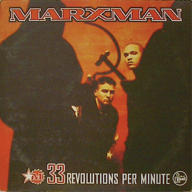Marxman's history began in Dublin, Ireland, with MC Hollis Byrne and electronic musician Oisín Lunny. The pair had met through their fathers, singer Michael Byrne and Donal Lunny, who had performed together in the '70s with Irish rock pioneers the Emmet Spiceland. Lunny was the founder of the Mood Club, one of Dublin's most popular weekly club nights during the late '80s, and Byrne was one of the earliest progenitors of graffiti art in Dublin. Meeting up in London in 1989, Lunny became the third member of a group fronted by Byrne, now performing under the name MC Hollis, and talented Bristol rapper MC Phrase (aka Stephen Brown). Lunny took a background role as programmer and instrumentalist, while mixer and scratcher DJ Kay One completed the lineup shortly afterward. Marxman's debut single, Sad Affair, was issued by Gilles Peterson's Talkin' Loud Records, then a satellite of Polygram, in the U.K. and Ireland in 1992; a rewrite of John Gibb's modern folk ballad Irish Ways and Irish Laws, it was quickly blacklisted by chart radio for its utterance of the phrase "tiocfaidh ár lá," the rallying cry of the IRA in Northern Ireland. By this point, however, the group's popularity had been established, and later in 1992 they capitalized with the release of a second single, the anti-slavery lament Ship Ahoy, which was bolstered by Sinéad O'Connor's sung chorus and the tin whistle of Afro Celts mainstay and then member of the Pogues James McNally.
In 1993, 33 Revolutions per Minute was released, along with a third single; All About Eve sampled Stevie Wonder's My Cherie Amour and tackled the issue of domestic abuse through a third party's eyes, while a video clip for the single was directed by Spike Jonze, immediately following his involvement in the Beastie Boys' Time for Lovin video. 33 Revolutions per Minute was issued in the U.S. in 1994, but failed to make a significant impact, and the group's momentum on the other side of the Atlantic halted simultaneously. Following the release of The Cynic EP, Marxman parted ways with Talkin' Loud; in 1995, they released Time Capsule, an angrier but more musically conservative effort, on the More Rockers label, before disbanding the following year. Oisín Lunny went on to have success as an electronic artist, releasing a successful single, The Mood Club, in 1999 on Independiente Records, and following it up with a full-length album, When It Hits You Feel No Pain, in 2001. ~ Dave Donnelly, Rovi













